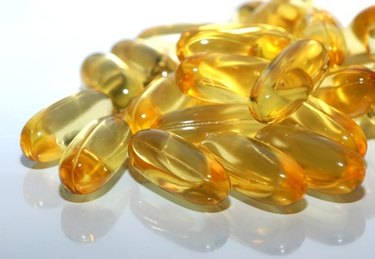
Cod liver oil can provide many benefits for the breast-feeding mother and her infant, but there are concerns about whether supplementation is safe. On one side of the controversy are those who think levels of omega-3 fats and vitamin D make cod liver oil the best choice for nursing mothers to obtain these nutrients. The other side of the debate focuses on vitamin A and potential contaminants that may make cod liver oil not worth the risk.
Cod Liver Oil
Video of the Day
Cod liver oil is high in omega-3 fatty acids, including the fat DHA, which is present in human breast milk and contributes to brain development. The human body cannot produce omega-3 fats on its own, but few foods other than fish, flax and walnuts contain appreciable amounts. In addition, cod liver oil contains 1,360 IU of vitamin D per tablespoon. Vitamin D is normally produced by the skin when it is exposed to sunlight, but many breast-fed babies are at risk of deficiency since infants are often protected from the sun. According to the Kellymom website, breast-feeding mothers who consume 2,000 to 4,000 IU of vitamin D every day have increased levels of this vitamin in their breast milk, to maintain the equivalent of 400 IU of daily vitamin D supplementation for the infant.
Video of the Day
Benefits
Because vitamin D deficiencies can cause rickets, a disorder characterized by soft and weak bones, maternal supplementation with cod liver oil can help prevent this disorder in breast-fed babies. Another benefit of cod liver oil supplements is increased intake of DHA by the mother. Breast milk is high in fat, and the composition of this fat changes depending on what the mother eats. A mother with a diet high in DHA is more likely to pass along this fat, instead of other fats, to her baby.
Vitamin A
The biggest risk from cod liver oil is an overdose of vitamin A. While this is more of a concern during pregnancy, since high levels of vitamin A can lead to birth defects, a breast-feeding mother may also be concerned about consuming too much vitamin A and passing it to the baby through her breast milk. Cod liver oil contains up to 4,500 IU of vitamin A per tablespoon. Some cod liver oil supplements have the vitamin A partially removed, so these reduced-vitamin A varieties may be a better option for nursing mothers.
Considerations
Because cod liver oil comes from the liver of fish, it may be more likely to carry contaminants such as PCBs than fish oil derived from other fish parts, even despite extensive purification. Fish oil supplements are an alternative source of omega-3 fats, but do not contain vitamin D. Therefore, breast-feeding mothers who take regular fish oil instead of cod liver oil should provide vitamin D supplementation to the baby if needed. In the end, you and your doctor should discuss benefits and risks of taking cod liver oil to determine which is the safest course for you and your baby.